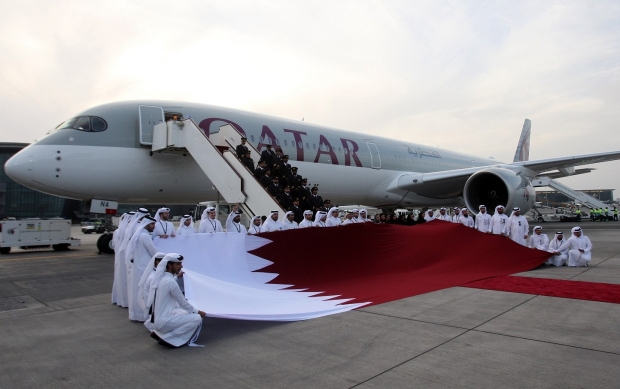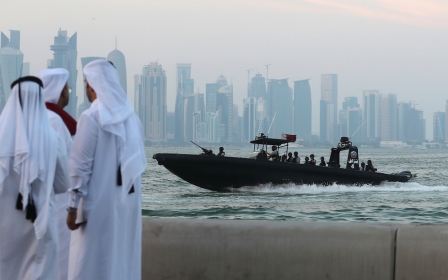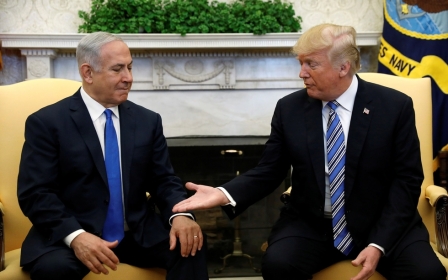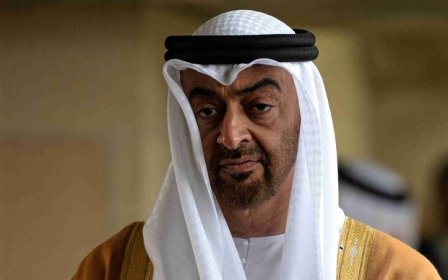ANALYSIS: Trump faces uphill struggle in quest to end Gulf crisis
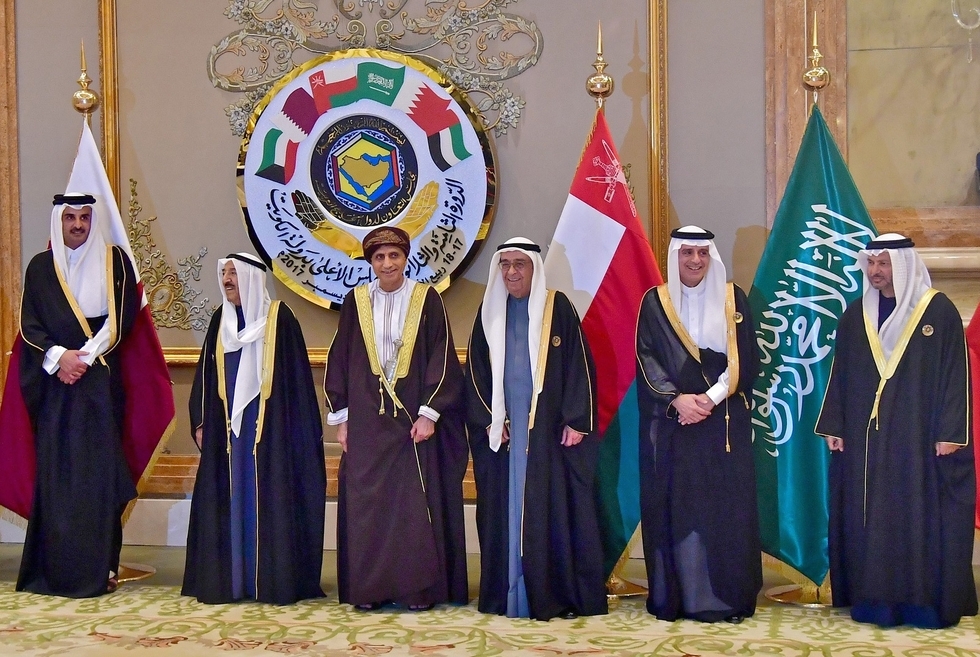
NEW YORK, United States – The nine-month-old blockade on Qatar has hurt economies, dislocated families and caused headaches for aviators. This week, unlikely victims were added to that list: the coiffed stars of Turkish soap operas, who have started losing millions of their Arab viewers.
The Saudi-owned MBC Group’s decision to stop airing the popular drama Al Dakheel and other Turkish shows has been linked to Ankara’s support for an ostracised Doha, as well as its backing for Islamist groups across the region.
It underscores how the rift between Qatar and its “quartet” of irked neighbours – Saudi Arabia, the Emirates (UAE), Bahrain and Egypt – is grinding on, even as the Trump administration revives efforts to end the row.
US President Donald Trump aims to host Gulf leaders at Camp David for a reconciliation meeting in May, but experts warned Middle East Eye of an uphill struggle before the feuding petro-royals pose for friendly photos at the wooded retreat.
One factor is new, said Hussein Ibish, from the Arab Gulf States Institute in Washington (AGSIW), a UAE-funded think-tank. After months of being unaligned, the White House, Pentagon and State Department are now cooperating to “aggressively mediate” the spat, he said.
Gulf unity is essential to our common interests of confronting Iran’s malign influence
- US State Department official
In recent days, Trump has spoken by phone to Saudi Arabia’s Crown Prince Mohammed bin Salman, the UAE’s Crown Prince of Abu Dhabi Mohammed bin Zayed, and Qatar’s ruling emir Sheikh Tamim bin Hamad al-Thani.
Those three royals also plan to visit Washington in March and April.
White House “readouts” of the three calls used near-identical language, stressing the "importance of regional cooperation". For Sigurd Neubauer, a Gulf analyst, the similar wording shows Trump does not wish to indicate a "preference for one Gulf ally over another".
'A reckoning'
Tim Lenderking, the top State Department official on the region, and retired Marine Corps General Anthony Zinni, are in the Arabian Peninsula this week to "discuss potential paths toward resolving" the feud, a department official told MEE.
"Gulf unity is essential to our common interests of confronting Iran’s malign influence, countering terrorism and ensuring a prosperous future for all of our Gulf partners," the official said, adding that the row was also hurting US businesses.
US military chiefs have other fears, as the dispute drives a wedge between two assets: the headquarters of the US Fifth Fleet in Bahrain, and Al Udeid Air Base in Qatar, which manages air strikes against the Islamic State (IS) group and other operations.
The current approach marks a shift from Trump's accusation in June that Doha funds terrorism at a "very high level," and towards the style of Secretary of State Rex Tillerson, who soothed tensions by signing an anti-terror financing deal with Qatar the following month.
In spite of stepped-up diplomacy, analysts said they were not sure if US mediation would yield a face-saving compromise or if the Gulf Cooperation Council (GCC) – made up of Saudi, the UAE, Qatar, Bahrain, Kuwait and Oman – may unravel.
“We’ve had nine months of rowing and the media vitriol that accompanies it. It’s hard to see how this can be resolved to everybody’s satisfaction. Nobody will get everything they want, it needs a compromise.”
What this “reckoning” might look like is hard to fathom. Neither side has budged far from their original positions. The quartet accuses Qatar of backing "terrorists" and its arch-rival Iran; Doha denies the allegations and rails about its violated sovereignty.
They’ll patch it up, but Qatar will always be on the lookout for its own interests, hedging its bets with friends outside the GCC.
- Imad Harb, Arab Center Washington DC
To end the blockade, Doha must curtail support for the Muslim Brotherhood and shutter Al Jazeera, the quartet said. Other demands include closing the Turkish military base in Qatar and severing all contact with Bahraini, Egyptian, Saudi and Emirati opposition figures.
Getting the two sides to move beyond opening gambits is the delicate manoeuvre that Washington has only just begun to attempt, said Ibish. It may yet flounder, like the dead-end efforts of Kuwaiti mediators.
“It’s a risky conversation for everyone to have,” Ibish told MEE.
“Qatar would need to accept that they have to move farther than they already have. It’s risky for the quartet, because they would have to say what they really want and what they’d actually be willing to accept, not these long laundry lists of over-the-top demands.”
'Risky conversation'
Washington’s envoys are in Doha, Abu Dhabi and Riyadh this week gauging how far each side might move on the core issues of gagging Qatari media, the hosting of Islamists and ties to Tehran and Ankara, said Ibish.
The US could hash out a deal and co-sign as a “guarantor” to ensure Doha comes good on its pledge, unlike past Gulf fallouts that left Abu Dhabi and Riyadh “feeling like they’d been played,” Ibish said. But there is still one missing ingredient, he added: leverage.
“It’s a case of trying to convince the quartet that this dispute is very awkward for the US and its military bases, and they should cooperate. Frankly, it’s not a convincing argument. Washington has work to do,” Ibish told MEE.
In spite of Washington's diplomatic overtures, the gap between US-allied Gulf states may be widening rather than narrowing.
Saudi’s crown prince has reportedly called the quarrel “very trivial” and likened it to the rift between Cuba and the US, which notably began with a revolution in 1959 and for six decades has resisted any wholesale resolution.
Meanwhile, Qatar has ramped up funding for lobbyists and think-tanks in Washington, playing catch up with the well-oiled public relations machines employed by the Emiratis and Saudis to spin the blockade to US lawmakers.
The latest example of dirty fighting came on Monday, when the BBC published leaked emails showing that the UAE lobbied the US to sack Tillerson for failing to side with the Emirates in its struggle against Qatar.
A spokesman for the sender of those emails - Elliott Broidy, a fundraiser for Trump who owns a private security company that has multimillion dollar contracts with the UAE - blamed Qatar for the hacked account.
For Neubauer, the row is “getting out of control,” as US journalists scour Emirati and Qatari ties to Trump’s senior adviser and son-in-law, Jared Kushner, who is himself being scrutinised by Special Counsel Robert Mueller’s election-meddling probe.
Ibish and Harb ultimately predict a climb-down: The need for GCC unity in a volatile region will once again outweigh the differences. But, much like the last time Qatar reconciled with its neighbours in 2014, the result will not be the happiest of marriages.
“They’ll patch it up, but Qatar will always be on the lookout for its own interests, hedging its bets with friends outside the GCC,” Harb told MEE. “They won’t put all their eggs in one basket anymore.”
Middle East Eye propose une couverture et une analyse indépendantes et incomparables du Moyen-Orient, de l’Afrique du Nord et d’autres régions du monde. Pour en savoir plus sur la reprise de ce contenu et les frais qui s’appliquent, veuillez remplir ce formulaire [en anglais]. Pour en savoir plus sur MEE, cliquez ici [en anglais].


